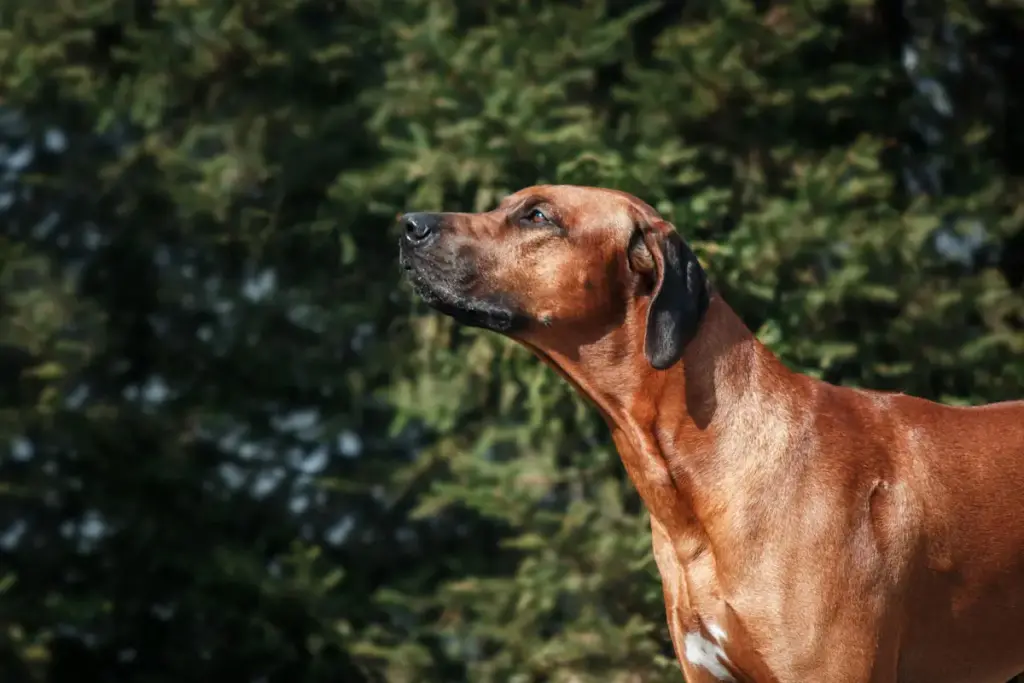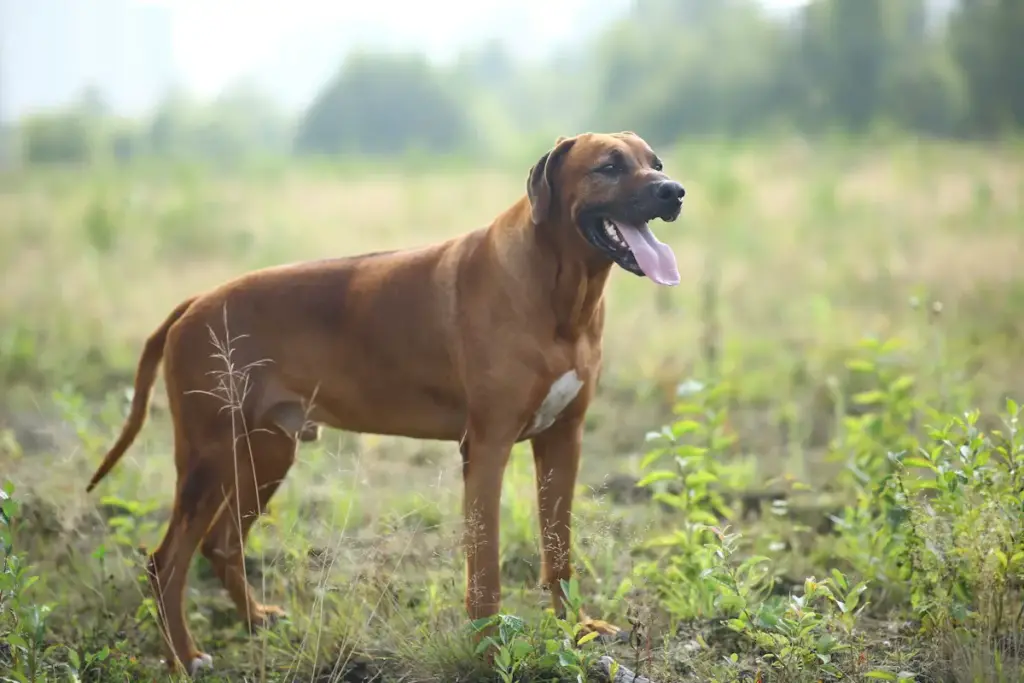Have you ever marveled at the sight of a Rhodesian Ridgeback, with its distinctive ridge and noble stance, and wondered what lies beneath that sleek coat? Originating from the southern tip of Africa, this breed was meticulously developed to track bay lions, earning it a reputation for courage and tenacity.
Yet, you’ll find they’re not just about brawn; these dogs possess a complex temperament that’s both dignified and affectionate. As you consider bringing a Ridgeback into your life, it’s essential to understand the nuances of their character—how they can be independent yet crave companionship or how their protective nature serves as a double-edged sword.
In exploring the traits of the Rhodesian Ridgeback, you’re about to uncover how this breed’s paradoxical nature requires a specific kind of commitment, one that might make you the ideal partner for this African hunter.
- Noise Level
- Energy
- Sociability
- Trainability
- Care
- Health
Overall
Summary
The Rhodesian Ridgeback is known for its moderate noise level, high energy, sociable nature, moderate trainability, moderate care needs, and good overall health.
Rhodesian Ridgeback: Traits, Temperament, and Care Guide
Drawing from their origins in Rhodesia, the Rhodesian Ridgeback exhibits a robust blend of traits including a gentle yet protective temperament, demanding an owner who can provide firm and consistent training and ample daily exercise.
Standing tall with a short, smooth coat, these dogs come in red, wheaten, and black hues, and are known for their affectionate, dignified, and independent nature. They’ll bark to alert you of strangers, encapsulating their protective instinct.
Rhodesian Ridgebacks adapt well to various living situations but do best with space to roam. They’re tolerant of children but can accidentally overwhelm the little ones with their size and vigor. For harmonious cohabitation, introduce them early to other pets.
Exploring the Characteristics of the Rhodesian Ridgeback
Building upon the foundational knowledge of the Rhodesian Ridgeback’s nature, let’s examine the breed’s distinctive characteristics in detail.
| Trait | Description | Relevance to Breed History |
|---|---|---|
| Size | Males: 25-27 inches, 80-100 pounds; Females: 24-26 inches, 60-80 pounds | Reflects their strength and agility in lion hunting. |
| Coat | Short, smooth; red, wheaten, black | The short coat is suitable for hot climates, aiding in hunting. |
| Temperament | Gentle, affectionate, dignified, independent, protective, barks at strangers | Balances the need for a loyal companion with protective instincts. |
| Lifespan | 10-13 years | Typical for a dog of its size, indicating robust health. |
As you consider joining the Rhodesian Ridgeback community, appreciate that their characteristic ridge and hunting abilities are not just mere traits; they’re a testament to a storied past, intertwined with the rich tapestry of African culture.
Rhodesian Ridgeback: A Comprehensive Profile and Guide
As you explore the Rhodesian Ridgeback’s comprehensive profile and guide, you’ll uncover the essential aspects of this breed’s unique character.
From its historical roots in big game hunting to the practical considerations for modern-day ownership, you’ll learn what sets these dogs apart regarding behavior, care, and compatibility with different lifestyles.
This section aims to clearly understand what to expect when considering a Rhodesian Ridgeback as your companion.
Everything You Need to Know
When considering the Rhodesian Ridgeback as your next canine companion, it’s essential to delve into the breed’s comprehensive profile to understand its unique characteristics and care requirements. Known historically as the African Lion Hound, this breed is a formidable hunting dog with a distinctive ridge along its spine that sets it apart. A protective instinct matches its dignified nature, making it a loyal family member.
- Distinctive Ridge: A hallmark of the breed, running along the spine.
- Temperament: Independent yet affectionate, a natural protector.
- Exercise Needs: Requires daily physical activity for well-being.
- Adaptability: Can thrive in various living environments.
- Health: Generally robust but watch for breed-specific issues.
Your connection with a Rhodesian Ridgeback will be enriched by understanding these facets of their existence.

Discovering the Temperament
Understanding the Rhodesian Ridgeback’s temperament is crucial. Their independent nature and protective instincts necessitate a knowledgeable approach to training and socialization. These dogs are descendants of hunters, and their prey drive is strong, which can influence their behavior.
You must channel their energy positively with consistent obedience training, emphasizing mutual respect and understanding. With their reserved and suspicious outlook towards strangers, fostering a sense of security and trust is essential. As a natural watchdog, a Ridgeback’s territorial tendencies require clear guidance to ensure they recognize your authority.
Their affectionate and courageous dispositions create a deep bond with family members, making them more than just pets—they’re integral members of the family unit. Remember, their high-energy essence demands your commitment to daily mental and physical stimulation.
Rhodesian Ridgeback: Is It a Good Fit for Families?
You may wonder if a Rhodesian Ridgeback is the right addition to your family dynamic.
Their inherent protective nature and affection can provide a strong bond with family members, yet their independent streak calls for an owner adept at providing consistent and assertive training.
While these dogs exhibit a gentle disposition around children, their high energy levels and size necessitate careful supervision, especially around younger family members.
Assessing Rhodesian Ridgeback’s Compatibility with Families and Kids
Assessing the Rhodesian Ridgeback’s compatibility with family life requires considering their temperament and behavior in a household setting, particularly around children. Here are key points to consider:
- Tolerant with kids, but supervision is key due to their size and vigor.
- Socialization is crucial for harmony with other pets.
- May overwhelm first-time owners; experienced handling is beneficial.
- Typically friendly with other dogs, but careful with multiple males.
- Natural protectors, they need firm, positive training.
Rhodesian Ridgebacks can be excellent family dogs when properly trained and socialized. They’re generally good with children, but because of their robust nature, interactions with young children should always be supervised. With commitment to their training and care, these dogs can be a loving addition to your household.
Ridgeback Climate Resilience
Although originally bred for the hot, harsh climate of South Africa, Rhodesian Ridgebacks have proven their resilience and adaptability to various warm environments due to their short, dense coat and robust endurance. As an African hunter, this breed’s history is steeped in survival and thriving within rugged landscapes.
While minimal in grooming, their coat offers an efficient way to manage heat, enhancing their climate resilience. The strong, muscular build of a Rhodesian Ridgeback and their high energy levels predispose them to excel in outdoor activities across diverse weather conditions.
Your Ridgeback will flourish best when it’s part of an active lifestyle. It will embody the spirit of endurance that’s been cultivated in it throughout its history as capable and adaptable hunters in Africa.
Curbing Ridgeback Stubbornness
You’ll find that addressing Rhodesian Ridgeback stubbornness requires a nuanced approach to training.
By establishing a regimen that’s both consistent and firm, yet fair, you set the stage for more effective behavior modification.
Blending mental challenges with regular exercise is crucial to mitigate their spirited energy. If not properly managed, this energy can fuel obstinate behavior.
Effective Training Strategies
To effectively train a Rhodesian Ridgeback and mitigate its inherent stubbornness, it’s essential to adopt a consistent and firm training approach. This will assert your authority while respecting the breed’s independent character. As intelligent dogs, Rhodesian Ridgebacks respond well to positive reinforcement, making it a cornerstone of successful training sessions. Early socialization is crucial to ensure a well-rounded temperament.
Here’s a strategic framework to guide you:
| Strategy | Description |
|---|---|
| Consistency | Implement regular training routines to establish clear expectations. |
| Positive Reinforcement | Use treats and praise to reward desired behaviors. |
| Mental Stimulation | Offer puzzle toys and varied obedience exercises. |
| Structured Exercise | Provide ample physical activities to manage energy levels. |

Exercise and Grooming Needs
Understanding the exercise and grooming needs of Rhodesian Ridgebacks is essential, as they require approximately two hours of daily physical activity and routine grooming to maintain their health and coat. Your Ridgeback will need plenty of exercise to channel its high energy. This significant exercise usually includes long walks, runs, or playtime in a securely fenced yard. Engaging in such activities keeps them physically fit and provides the necessary mental stimulation.
With their low-maintenance coat, grooming is relatively straightforward. It involves regular nail trimming, teeth cleaning, and brushing to remove loose hair. Bathing should occur every 4 to 8 weeks, unless they get particularly dirty. Meeting these needs’ll ensure your Ridgeback remains a vibrant and well-integrated family member.
Health Considerations
When considering a Rhodesian Ridgeback, you must be aware of their susceptibility to specific health issues, including Elbow and Hip Dysplasia and Dermoid Sinus. These conditions can significantly impact your dog’s quality of life and may require careful management or medical intervention.
Understanding the breed’s typical lifespan and potential genetic health risks is crucial for providing a nurturing environment and ensuring your pet’s long, healthy life.
Common Health Issues and Lifespan
Rhodesian Ridgebacks typically enjoy a lifespan of 10-13 years, yet with vigilant care, some can extend their lives up to 15 years. However, they are susceptible to specific health issues like Elbow Dysplasia, Hip Dysplasia, and Dermoid Sinus. These health issues require careful monitoring to ensure your Ridgeback maintains its well-being.
Hip dysplasia is a genetic condition marked by an improperly formed hip joint. It can lead to discomfort and mobility challenges for your dog. Similarly, elbow dysplasia, an abnormal development of the elbow joint, is a concern that can affect your dog’s quality of life.
Proactive management is essential to mitigate these risks and support a longer, healthier life for your beloved companion. This includes regular veterinary check-ups, appropriate exercise, and a balanced diet. Taking these measures can help your Rhodesian Ridgeback live a longer and happier life.
Is Rhodesian Ridgeback the Right Dog for You?
Considering a Rhodesian Ridgeback as your next canine companion requires assessing whether their characteristics align with your lifestyle and experience in dog ownership. This breed may resonate with you if you’re seeking a family protector with a gentle yet independent streak.
Their energy levels demand an owner who can keep pace with consistent exercise and mental stimulation. The Rhodesian Ridgeback’s strong prey drive necessitates firm, fair training, ideally suiting those with previous dog handling knowledge. They can be a robust presence around kids, warranting supervision with little ones.
This breed’s low-maintenance grooming is a plus for busy owners. However, they’re not recommended for first-time or timid owners due to their assertive leadership needs. Reflect on these traits to determine if a Rhodesian Ridgeback will thrive in your world.
Alternatives for Rhodesian Ridgeback: Dignified and Courageous Large Breeds
Explore these breeds if you’re drawn to the Rhodesian Ridgeback’s dignity and courage, ideal for those who value strong and noble large dogs.
| Similar Dogs | Short Description |
|---|---|
| Doberman Pinscher | A breed known for its loyalty and protective instincts, strong and intelligent. |
| Rottweiler | A robust breed, great for protection and known for its loyalty. |
| Boxer | Energetic and playful, great with families and known for its protective nature. |
| Weimaraner | Distinguished by its grey coat, known for stamina and a friendly demeanor. |
| Vizsla | A Hungarian breed known for its hunting skills and affectionate nature. |
Conclusion
So, you fancy a Rhodesian Ridgeback, the regal lion hunter with a hairdo to envy. Marvel at their dignified strut, but don’t be fooled; beneath that poised exterior is a willful spirit that’ll test your “alpha” status.
Commit to daily marathons and your role as a treat-dispensing entertainer, or watch your shoes become chew toys. Perfect for families—if your idea of family fun is outsmarting a clever canine.
Choose wisely, lest your couch bears the brunt of a bored Ridgeback’s day.
